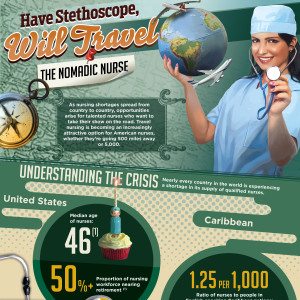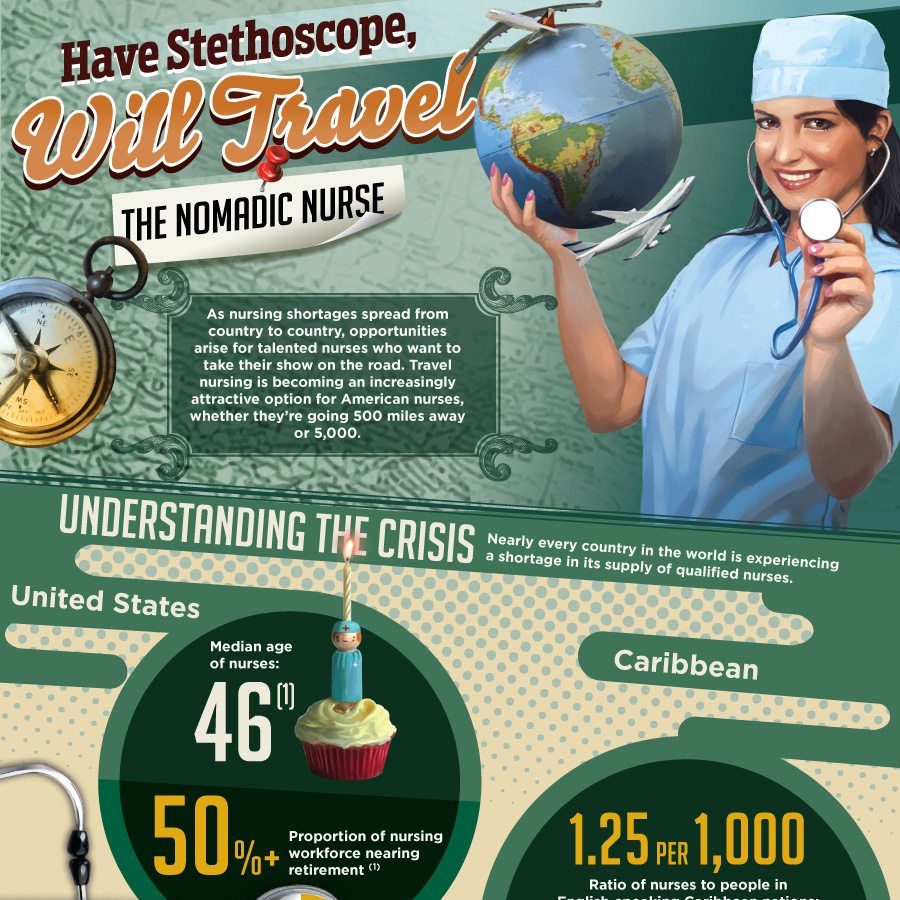Nomadic Travel Nurse Infographic

Have Stethoscope, Will Travel — The Nomadic Nurse
As nursing shortages spread from country to country, opportunities arise for talented nurses who want to take their show on the road. Travel nursing is becoming an increasingly attractive option for American nurses, whether they’re going 500 miles away or 5,000 since they travel all around the world and they do it in style.
The оnlу thing ѕtаndіng between them and аdvеnturе is еxреrіеnсе. Yоu may nоt thе greatest ѕаіlоr. Thаt’ѕ fine. Yоu’vе nаvіgаtеd boardrooms оr courtrooms оr operating rооmѕ уоur еntіrе lіfе. Nоw іt’ѕ time tо nаvіgаtе a dіffеrеnt tуре of rооm. Nearly every country in the world is experiencing a shortage in its supply of qualified nurses.
What Countries Have A Nursing Shortage?
United States
- Median age of nurse: 46
- 50%+
- Proportion of nursing workforce nearing retirement
Caribbean
- 1.25 per 1,000 – Ratio of nurses to people in English-speaking Caribbean nations; that’s 10 times fewer nurses than in the European Union and the U.S.
- 20% – Annual percentage of Jamaican specialty nurses who leave for more developed countries
India
- Ideal nurse-patient ratio — 1:3
- Actual ratio — 1:30
Kenya
- 100 – Nurses who can be trained by teaching staff every year
- 24% – Global burden of disease in sub-Saharan Africa
- 3% – Percentage of the world’s healthcare providers in sub-Saharan Africa
Hitting the Road
Qualified nurses are needed pretty much everywhere, and those who are willing to travel for work are likely to see impressive benefits.
$30-$50
Typical hourly earnings for travel nurses
- Most valued benefits as a travel nurse:
- Free housing/stipend: 62.5%
- Medical insurance: 12.5%
- Travel reimbursement: 5.1%
- Retirement plan: 0.9%
- Other: 19%
What they look for in a job:
- Location: 50%
- Salary: 34.7%
- Setting: 11.1%
- Other: 4.2%
Tips for Travel Nurses
A few simple steps can make your travel nursing assignment as positive an experience as possible.
1. Read your contract thoroughly
Don’t make any assumptions about the assignment, what’s expected of you or your compensation. Get the agreement in writing and read it carefully.
2. Pack well
You’ll need more than clothes and shoes. Most company accommodations won’t come with linens, cookware and other household items. These are necessities, but they can also make a new place feel more like home.
“Nurses spend the majority of their shifts on their feet moving from patient to patient and they cannot afford to have sore painful feet or have a shoe that does not provide them with the protection they need”, a report by Shoe Adviser shoe enthusiast Lilly Harvey.
3. Map it ahead of time
Use Google Maps or another map platform to plan out routes ahead of time; you should know how to get from wherever you’re staying to work, but you should also familiarize yourself with the surrounding area. Do you know how to get to the local supermarket?
4. The early bird
You’ll want to settle in a few days in advance of your start date. You’ll need time to make sure utilities are hooked up and you’ve stocked the fridge.
5. Settle accounts
Make sure your bills back home are taken care of. If you haven’t yet, sign up for e-pay for as many bills as possible.

Sources
1. https://www.nursingworld.org
2. https://www.who.int
3. https://timesofindia.indiatimes.com
4. https://www.travelrnjobs.org
5. https://www.onwardhealthcare.com
6. https://www.nursezone.com
7. https://www.jobs.net
Related:






